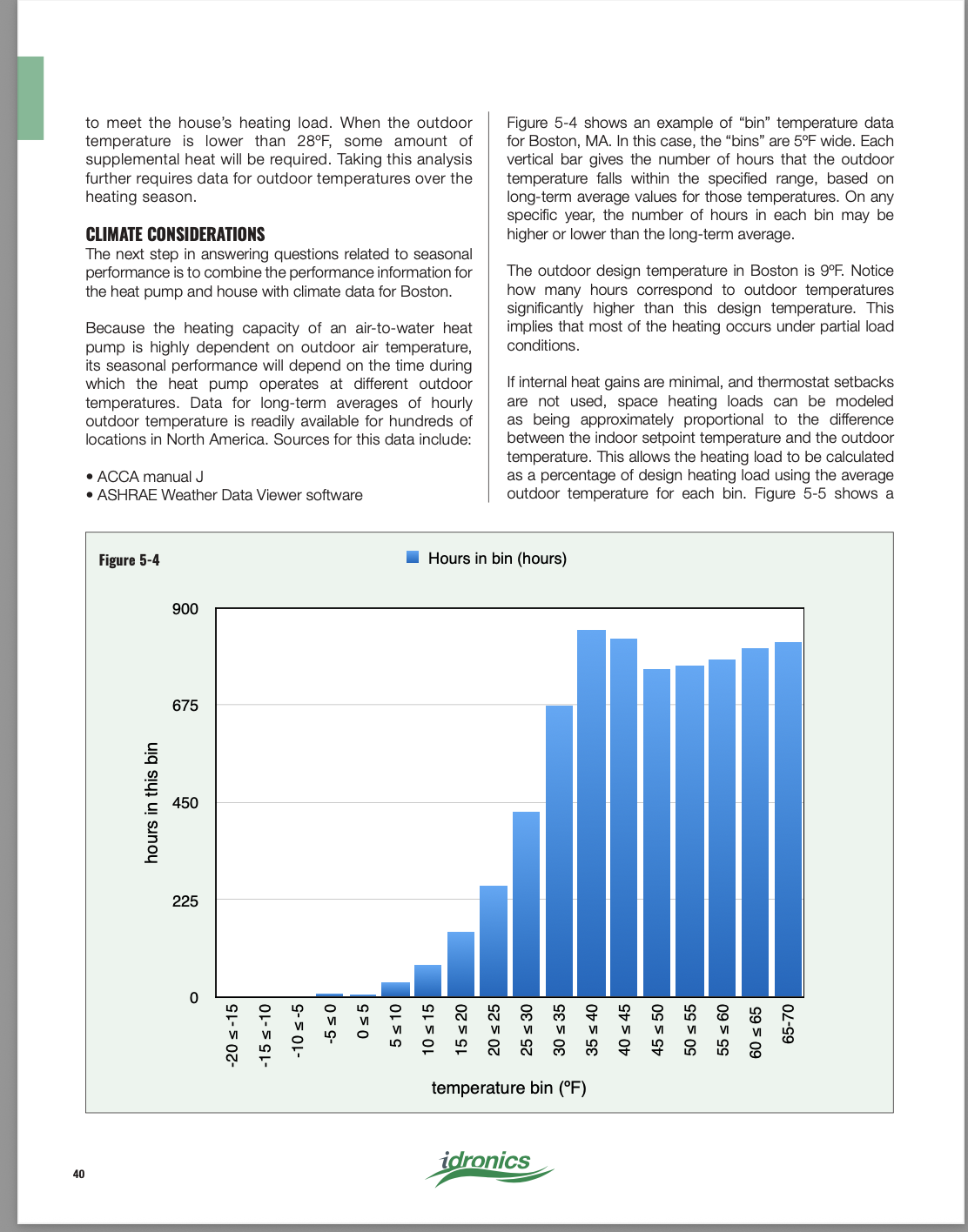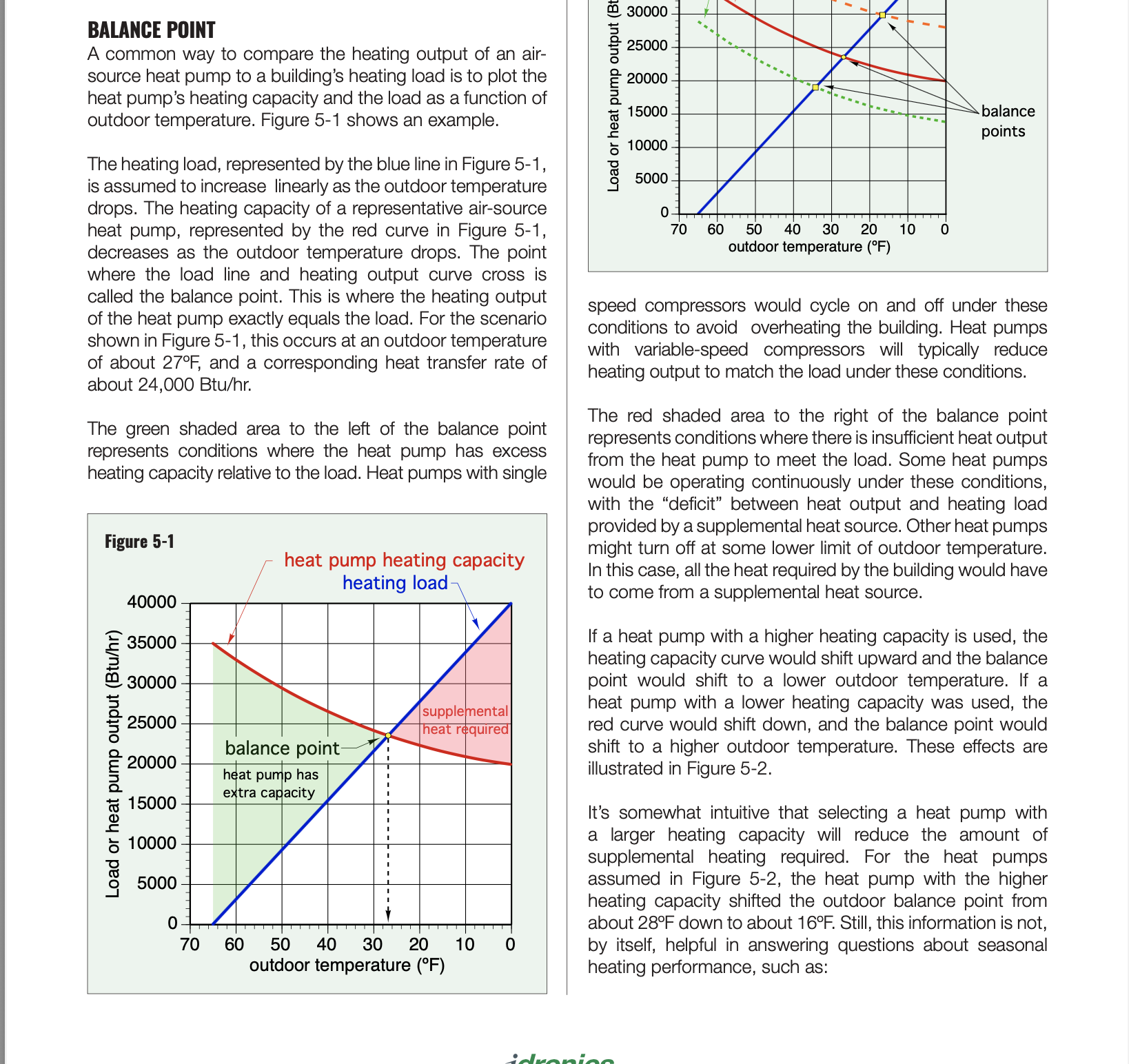Boston weather with heat pump
right now we are paying 33 cents per kilowatt. And its going up another 12 percent - probably putting us in the highest top three when comparing all states.
In another thread it was determined that at around 30 degrees its cheaper to run a high efficiency gas boiler / 95 % than use the heat pump for heat.
If a heat pump is not used over the winter it seems like a waste to have it turn on that outside heater. So if the power to the unit was shut off (breaker in panel) and the unit was needed for emergency heat (if the gas boiler broke), how long would that outside unit need power to warm things up? I would not want to damage the compressor for lack of oil.
Utility bills are soaring in this state..
Comments
-
-
In another thread it was determined that at around 30 degrees its cheaper to run a high efficiency gas boiler / 95 % than use the heat pump for heat.
Where did you read this?
Try this instead………Fuel Comparison Calculator for Home Heating | Coalpail.com
See exactly when its cheaper to run NG of Electric.
A good Heat Pump properly sized and installed should supply 90+% of your heating needs.
1 -
You have to rather carefully compare the energy cost for the heat — and in New England (not just MA) the breakeven point for gas, oil, and electric varies (forget LP entirely). Cedric is oil fired, and we have a good low temperature heat pump for one apartment in addition. Cedric is the cheapest to run by a considerable margin, even at 30 F or so; the break point is up around 40. We do run the heat pump anyway, as the tenant in the apartment likes things warmer.
Br. Jamie, osb
Building superintendent/caretaker, 7200 sq. ft. historic house museum with dependencies in New England0 -
Are you talking about and air to water heat pump connected to the hydronics? Or some sort of air to air.
Here is some data that relates to both as far as Boston design temperature and BIN data.
This issue of Idronics uses Boston as one of the design examples, for an air to water HP option.
You really want to use data specific to your area and application
Bob "hot rod" Rohr
trainer for Caleffi NA
Living the hydronic dream0 -
you’re in MA—You did not mentionMassSave. If you’re taking on rebate money, they have all sorts of rules
With all that said, natural gas is the cheapest way to heat in Massachusetts.
1 -
Boston area its cheaper to heat with nat gas and 95 % boiler. There is a heat pump for a.c. in part of the apartment. The heat pump is not in all rooms so the resident uses nat gas boiler with rads for winter.
The mini split is only used in the summer. Only once in 4 years was it used in the winter for when the boiler was being replaced.
Being that there is a heater in the outside unit that runs in the coldest days my question is if the breaker is shut off over the winter and we needed heat (due to boiler not working), how long would we need to have that outside heater on before turning on heat mode in mini split?
It seems like a waste of electrons to keep that outside pan heater on when the mini is not going to be used for heat.
1 -
Maybe the manual will say. I would like to know the actual savings of leaving the power off vs on but not used. $
0 -
Jamie, we've been over this before. You sent me your energy costs, your break-even COP is 2.85. With something like a Mitsubishi M-Series you get that at about 26F. See :
https://ashp.neep.org/#!/product/34584/7/25000/95/7500/0///0
0 -
"In another thread it was determined that at around 30 degrees its cheaper to run a high efficiency gas boiler / 95 % than use the heat pump for heat."
This calculation depends upon the cost of gas and the cost of electricity, both of which vary substantially by region and over time. It also depends upon the efficiency of the heat pump, which varies based upon the equipment and the heating load of the house.
People in the industry seem to love that 30F magic number but it's not useful at all.
0 -
OK, with electricity at $0.37/kWh and natural gas at $25 per 1000 cubic feet*, burner efficiency of 95%, I get your break-even COP at 4.12, which you'd hit at 38F with a Mitsubishi M-series.
In a typical Boston winter, the heat pump would cost 29% more than gas.
Using the heat pump above 38F and gas below would save 1.6% in a typical winter, or $50 on a $3000 heating bill.
*(From the EIA website: )
0 -
If you have a quality heat pump, the pan heater should not turn on if it is sitting idle. The crankcase heater may, but the pan heater should not.
0 -
I believe MA actually dropped their electricity rates for the upcoming winter? The distribution rates that is.
0 -
that heater is cheap insurance. Turn it off and there are consequences when restarting and there no cheap.
0 -
I was just snickering at this, but on a lark I punched in to Google a 30 watt CCH at 40¢/kWH and it spit out $100/year, if it's on all the time. Even if it's only on half the time, that's still quite a bit.
OTOH, mfgrs don't add things that aren't necessary to keep their warranty claims manageable.
A base pan heater is a completely different animal. It's only going to e on when it's needed.
0
Categories
- All Categories
- 87.5K THE MAIN WALL
- 3.3K A-C, Heat Pumps & Refrigeration
- 61 Biomass
- 430 Carbon Monoxide Awareness
- 122 Chimneys & Flues
- 2.1K Domestic Hot Water
- 5.9K Gas Heating
- 116 Geothermal
- 169 Indoor-Air Quality
- 3.8K Oil Heating
- 78 Pipe Deterioration
- 1K Plumbing
- 6.6K Radiant Heating
- 395 Solar
- 15.9K Strictly Steam
- 3.5K Thermostats and Controls
- 57 Water Quality
- 51 Industry Classes
- 51 Job Opportunities
- 18 Recall Announcements







